Superb classic bus running day in Winchester
Posted by Chris Graham on 14th March 2024
Since the 1980s it’s been a tradition in city of Winchester to hold a bus running day. Dave Vaughan was there to cover this year’s event.
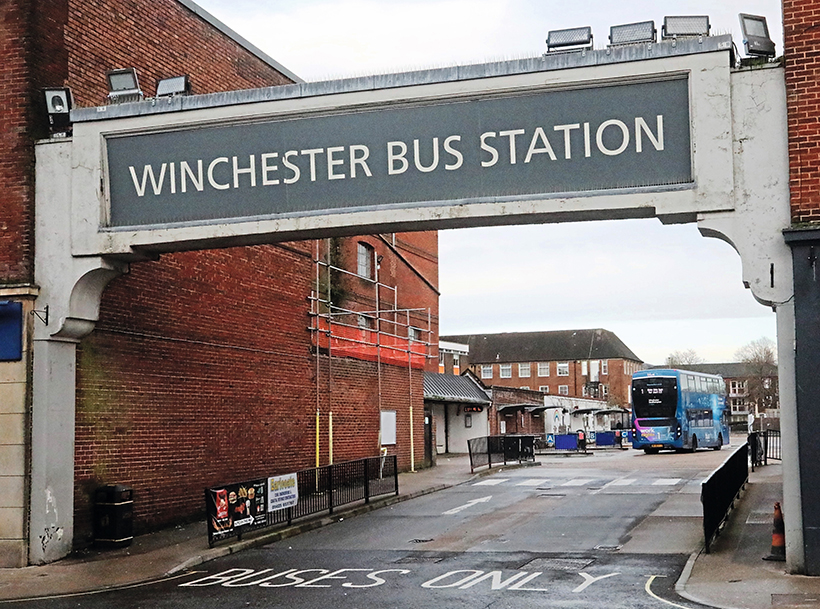
Bus running day: The old bus station on The Broad was the point at which all King Alfred services, and later Hants & Dorset, started from. Now partly demolished, it’s still used by Stagecoach buses and was the layover point for buses on the running day services.
It’s to celebrate the history of that city’s long association with its one-time local bus operator R Chisnell & Sons, better known as King Alfred Motor Services, who were one of only a few privately owned bus companies to run a municipal bus service.
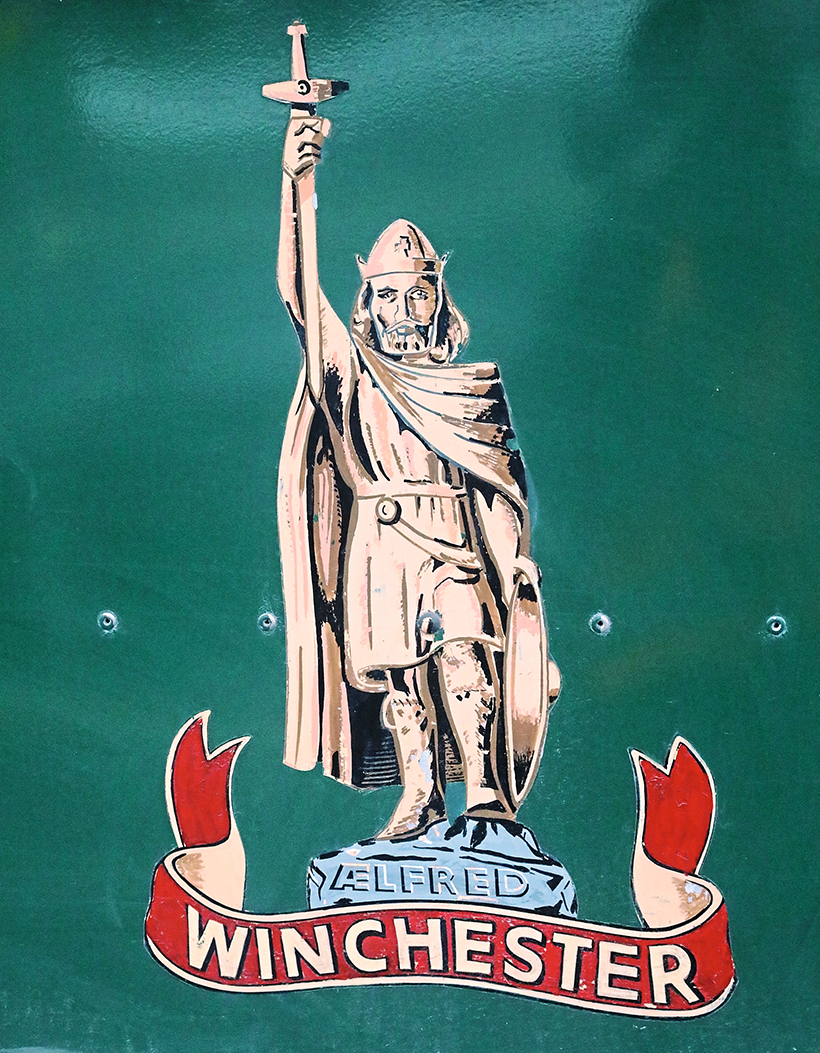
All King Alfred buses carried this logo featuring Alfred himself and the town he made famous by using it as the centre of his Saxon kingdom.
The Chisnell family’s involvement in bus services goes back to 1915 when, using a variety of small motor vehicles, he transported troops to and from various military training camps in the area. On Whit Monday in 1915, using an ex-RAF war subsidy Leyland, he ran his first charabanc excursion to Bournemouth.
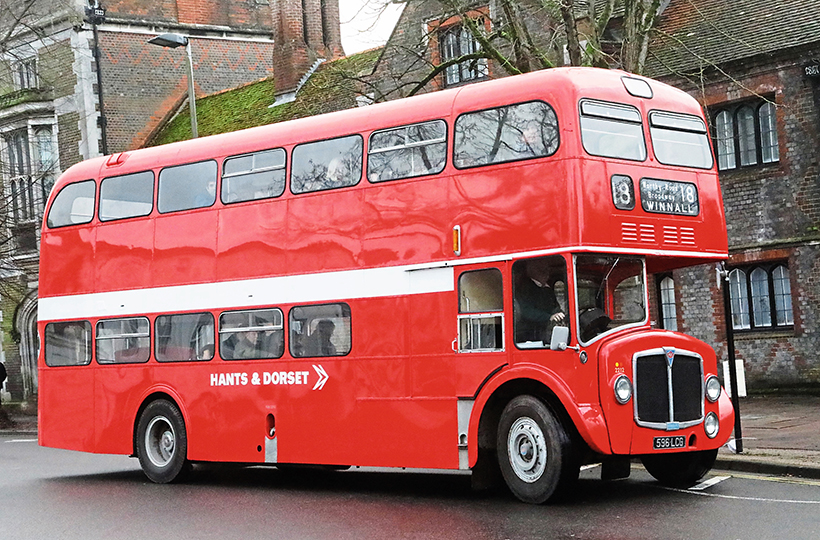
One of two rare examples of the AEC lowbridge Renown 596 LCG was built with a Park Royal body in 1964 and is shown in the NCB livery of Hants & Dorset as it was last in service.
The firm became a registered company in 1939 and, despite competition from other operators in the area, maintained a staunch degree of independence, personified by the emblem of King Alfred the Great who used Winchester as the centre of his kingdom, proudly displayed on the side panels of its vehicles.
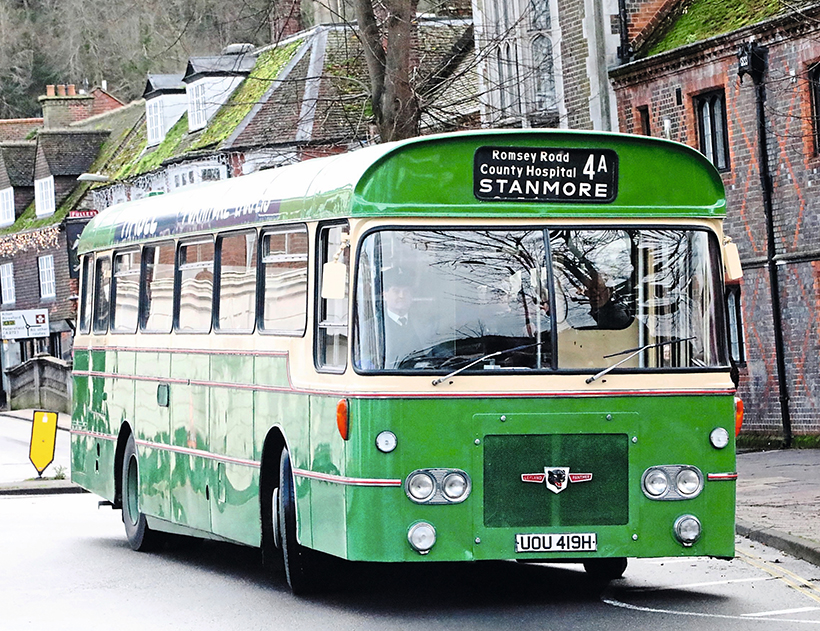
No. 417 in the King Alfred fleet is a Leyland Panther PSUR1A/1R with a BET standard body by Plaxton built in 1970. It’s on route 4a, one of the 13 original King Alfred routes covered on the day, and is seen here arriving at The Broad with a background of some of the many picturesque buildings in the city.
The first regular omnibus services began in 1922 running to a new council housing estate at Stanmore. From these small beginnings an extensive network was built up serving most districts of the city and running as far afield as Basingstoke and Stockbridge. By the time the Second World War broke out R Chisnell & Sons Ltd was acknowledged as the primary local operator for the Winchester area, with an enviable reputation for good service.
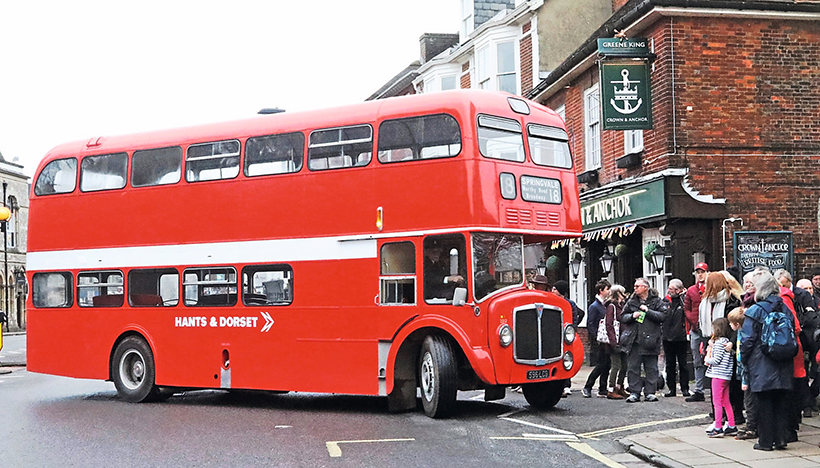
A tight turn for the ex-Hants & Dorset Renown; no power steering here just strong arms and a sharp driver’s eye needed.
Robert Chisnell senior died in June 1945 and his sons ‘Mr Bob’ and ‘Mr Fred’ continued to run a successful business, despite staff shortages, increased use of motor cars, and city centre traffic congestion causing timetable problems. By the start of the 70s the sons had reached retiring age and endeavoured to sell the firm to the local council which, owing to government policy at the time, was not possible. In the end the company passed to the then new National Bus Company in the form of Hants & Dorset, who ran services from the bus station situated on The Broad in the city centre.
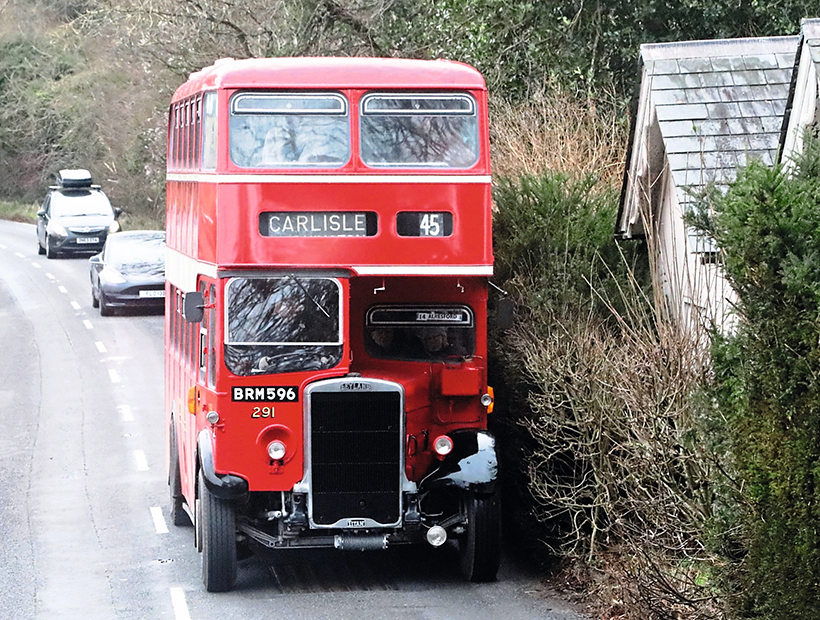
A long way from Carlisle. This 1936 Leyland TD4 was a visitor to the running day and was making its debut at the event. Seen here running through the Hampshire countryside, it’s looking very smart and is a fine example of recent restoration work by its owners.
29 April 1973 was a sad day for the Chisnell family and their staff as the familiar green and cream buses with their proud emblem of King Alfred were swept away in favour of the rather uninspiring poppy red livery of the NBC. However, the memories of King Alfred Motor Services lived on in the local population and, in 1985, a small but dedicated band of enthusiasts got together to form The Friends of King Alfred Buses.
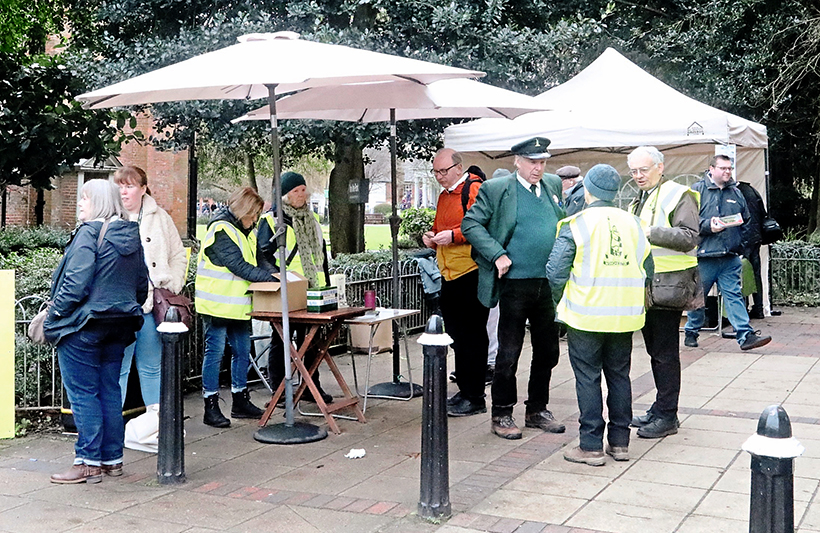
The FoKAB volunteers did a great job in rostering all the crews and organising the arrivals and departures. Their stall sold the timetable booklet and the excellent book on the Olympic restoration, with an appeal for its rebuilding after the recent disastrous fire.
In company with the editor, I went along to enjoy the New Year’s Day King Alfred Bus running event; in effect a bus rally on the move! I had arranged a meeting with James Freeman, the chair of the friends trust, known as FoKAB, to get an idea of how it all started and what the future held for the group.
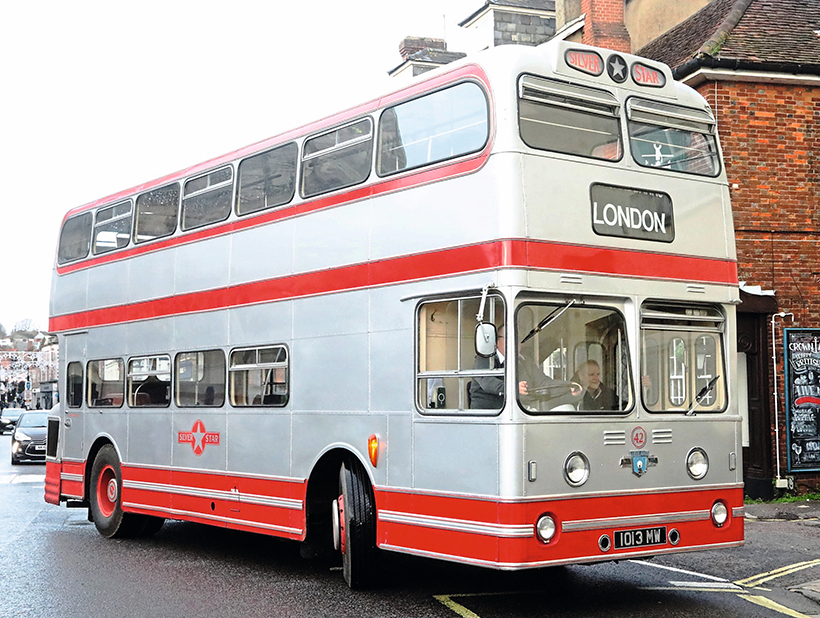
This Leyland Atlantean PDR1/1 with its Weymann 72-seat front-entrance body is believed to have been the first of its type to be sold to an independent operator, in this case Silver Star of Porton Down. The fleet had an attractive livery and featured the fleet name in a distinctive rooftop box.
New Year’s Day, 2024
The Friends of King Alfred Buses (FoKAB) have held a bus running day on or around 1 January starting in the 80s when as many of the fleet of buses owned by the friends are gathered in the centre of Winchester and spend the day running free bus services to various parts of the old King Alfred bus area following, as closely as possible, the routes of some of the old services. I have attended this event in the past when the weather has been typically wintry with below-zero temperatures and even snow on the ground.
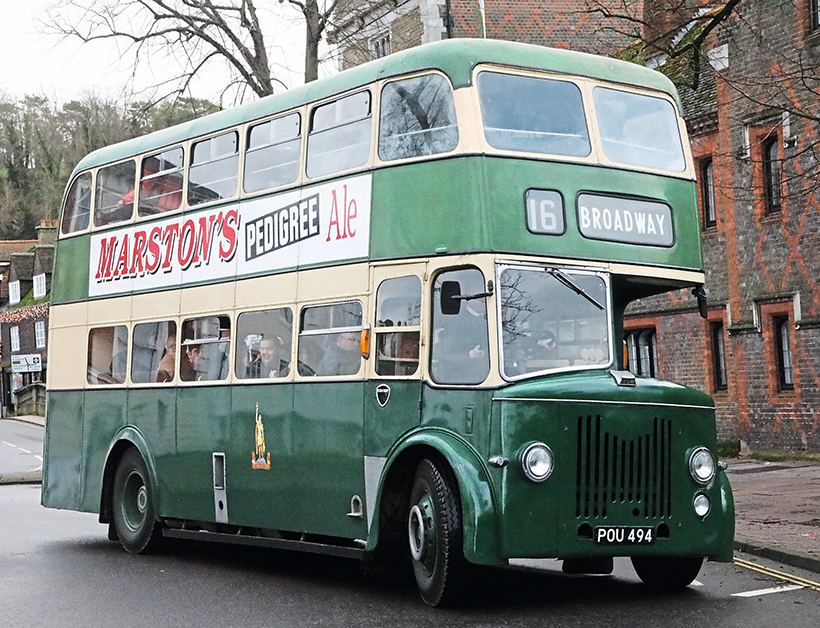
King Alfred buses used the registration number as a fleet number so this was No. 494 in the fleet. It’s a Leyland Titan PD2/24 built in 1956, with an East Lancs 55-seat body and is on a local route to Oliver’s Battery.
This year, however, the weather was fairly mild and the sun shone through a wintry sky until late in the afternoon. The local bus company Stagecoach do not run services in the area on New Year’s Day so, apart from an express service to Southampton run by Go South Coast under the Bluestar brand, it was a case of turning back the clock with the area known as The Broad full of classic King Alfred-liveried buses running in and out all day, centred round the statue of King Alfred himself.
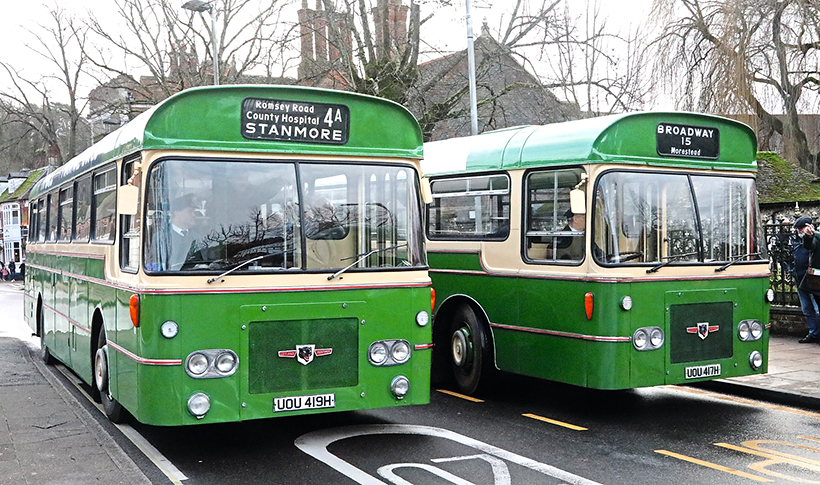
A pair of Panthers were reported as being loose in the city centre, but not to worry – it was these two Leyland Panthers with BET Federation-style Plaxton bodies, bought by King Alfred in 1970.
When I arrived at 9am the buses were getting ready to go out on the first of the day’s services and the street was largely free of normal traffic or people shopping, so an ideal opportunity to photograph the fleet as one-by-one eight buses from the collection, plus a couple of visiting vehicles, took up their positions.
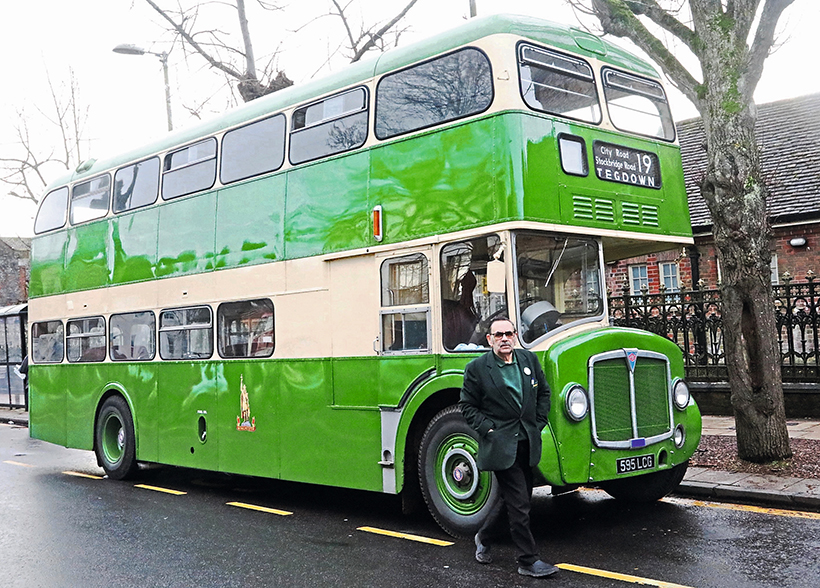
In a break from their usual purchases of Leyland vehicles, King Alfred purchased two AEC Renown lowbridge double-deckers to deal with routes passing under low railway bridges. They had a chassis-less design enabling a low floor height in the lower saloon and not, as was usual in lowbridge buses at the time, a sunken gangway on the upper floor. Note the sliding driver’s door necessitating the unusual positioning of the direction indicator on the top deck panel.
The old bus station in the city centre, once the centre of King Alfred operations, is looking rather rundown but provided the perfect lay-over parking area for the buses between services. With parking in the nearby multi-storey car park – free on Bank Holidays! It wasn’t long before the Broad was filling up with enthusiasts who had come from far and wide to this popular event.
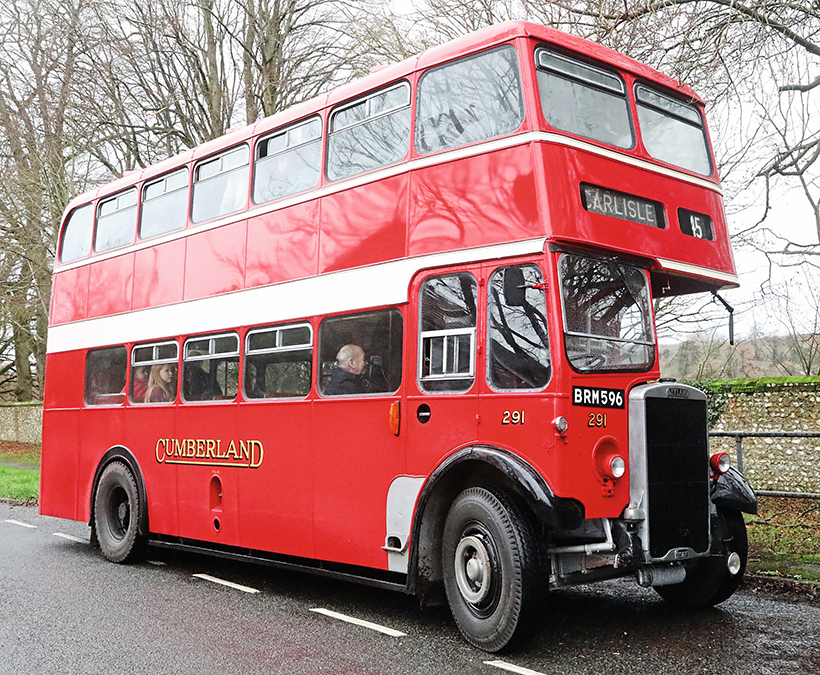
A photo stop on a country route for ex-Cumberland Motor Services Leyland TD4 of 1936 shows the high standard of restoration on this vehicle, a product of years of hard work since the bus was found abandoned in a yard in Huddersfield.
Many members of the public were also taking advantage of a free ride into the lovely Hampshire countryside. James Freeman and his band of hard-working marshals were kept busy making sure all the services were running to time and crewed by a PCV-licenced driver and a conductor whose job it was to make sure passengers boarded and alighted vehicles safely.
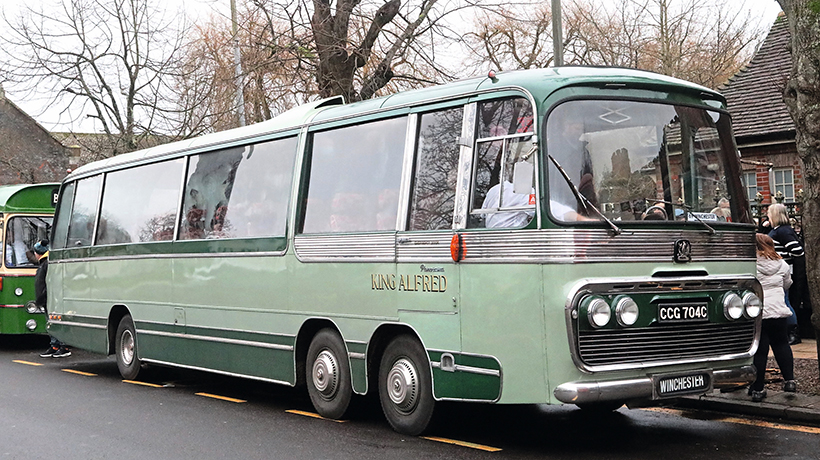
The innovative Bedford VAL design featured twin steered front axles and smaller wheels, allowing for a low floor height while retaining a conventional, front-mounted – as opposed to an underfloor – engine. This 1965 example has a Plaxton Panorama 49-seat coach body and was in the King Alfred coaching fleet livery. It proved very popular with the public and always carried a full load at the event.
All rides were free but FoKAB volunteers had a stall where a full-coloured and very informative leaflet and timetable was available for only £5, enabling passengers to get on the right bus at the right time. Altogether there were eleven different services going as far afield as Sutton Scotney to the north and Fareham in the south, where passengers wishing to do so could meet up with buses provided by the Provincial Bus Society. They were running their own ‘Ale and Ride’ services in the Gosport and Fareham area on the day.

Apart from the modern street furniture, this is a timeless scene as visiting Alexander Leyland PD2 dating form 1953 is passed by a 1968-registered Morris Minor while waiting its turn of duty. When in the fleet of Alexander Northern, this bus was stationed at the Bannockburn depot.
Bus crews were turned out in fine style with genuine King Alfred uniforms and even, in some cases, Setright ticket machines of the type once used by the company. Passengers, especially children, were pleased to get a genuine period bus ticket as a souvenir of their trip. Of the sixteen vehicles in the preserved fleet seven were rostered for the day and I enjoyed a ride out on one of two examples of the AEC Renown lowbridge double-deckers in the collection. By the time the Renown appeared on the market in the 1960s rear-engined buses such the Leyland Atlantean and Daimler Fleetline were becoming the choice of many operators and, as Leyland had taken over AEC in that decade, the half-cab front-engined AEC Renown was dropped from the range.
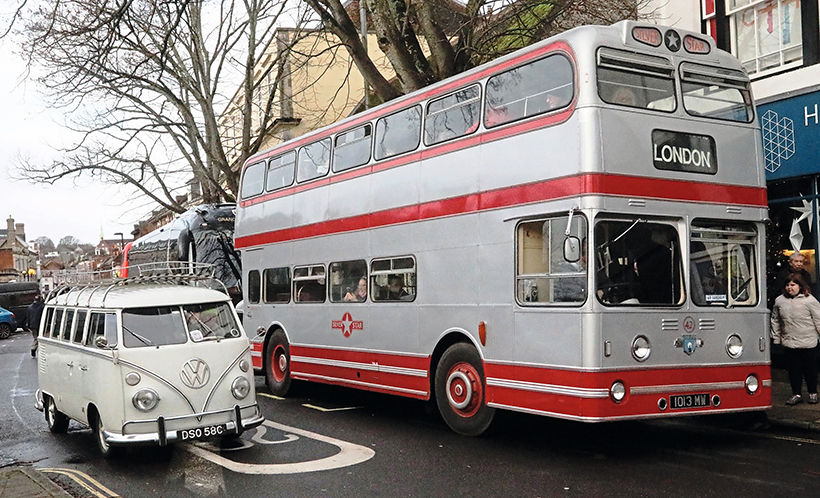
A 1964-registered split-screen VW in very original condition is seen passing the Silver Star Leyland Atlantean; one of five visiting buses used in service on the running day.
There were also four visiting buses taking part, one of which particularly attracted my attention as it was making its rally debut and looking very smart indeed. Bearing the bright red livery of Cumberland Motor Services, whose once large fleet was based at Whitehaven in the Lake District, it was a 1936-built Leyland Titan TD4, originally having Massey bodywork but re-bodied by Eastern Coachworks in 1950. The bus had been preserved in the 1960s and rallied extensively in the 70s but was found by the present owners, Steven Morris and Peter Snowden, abandoned in a Huddersfield haulier’s yard and, after extensive restoration, was now back on the road and based at Wiveliscombe in Somerset.
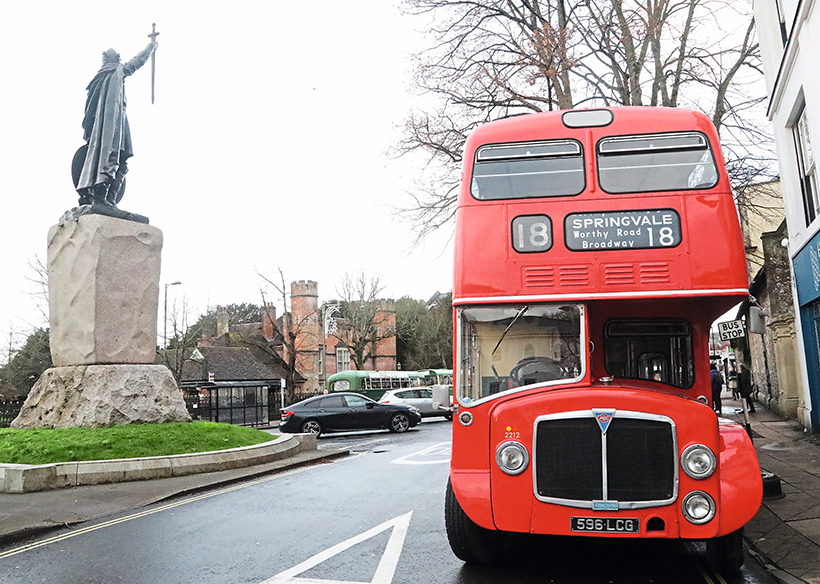
The statue of Saxon King Alfred the Great stands proudly on its plinth in The Broad, and is used as the logo for King Alfred buses. Hants & Dorset Fleet No. 2212, once No. 596 in the King Alfred fleet, stands by awaiting its next turn of duty on route 18.
I enjoyed two further trips out on different routes past some of the famous Hampshire watercress beds that give the name ‘The Watercress Line’ to the nearby Mid Hants steam railway. By 3:30 it was time to head home to Sussex and so, with the light fading, I bid farewell to Winchester and the team of FoKAB volunteers who had been working hard to cope with the full loadings on most of the buses all day. My thanks go to James Freeman and his team for a well-organised, friendly and enjoyable event.
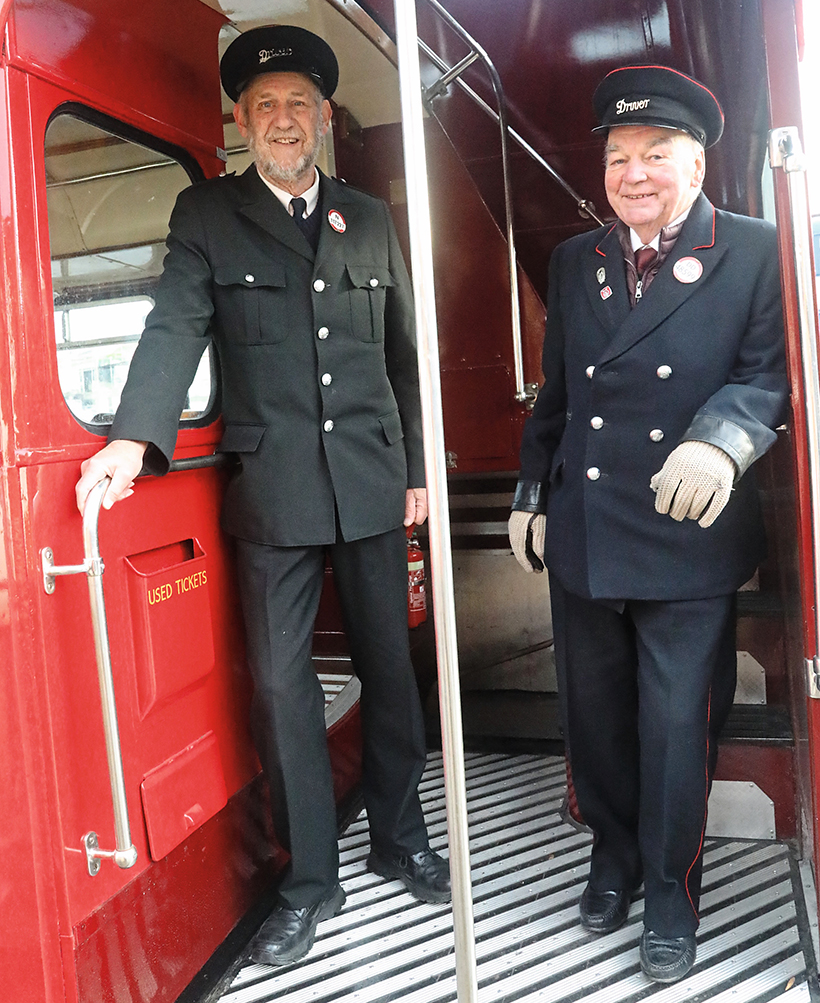
The crew of the Cumberland Motor Services Leyland stand on the platform of the bus in the bus station during a break. Peter Snowden is on the left and owner Steven Morris is on his right. The standard of restoration of this 1936-built bus is as good inside as it is on the outside.
The book The Return of the Olympic is available for £12.95 (including postage) from Friends of King Alfred Buses, 13 Ashley Close, Winchester SO22 6LR, and full details of the group can be found at: kingalfredbuses.org.uk
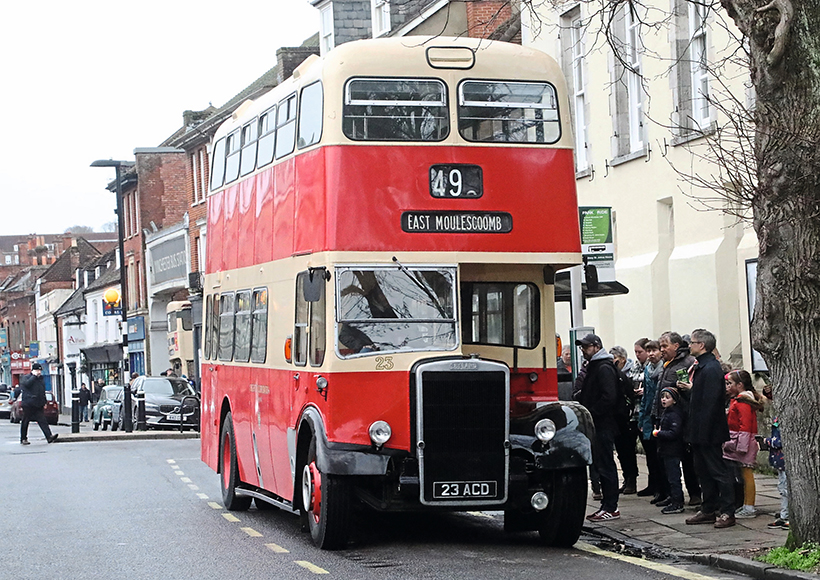
A long way from its Brighton base is Brighton Corporation No. 23, a Leyland PD2/37 with Weymann body built in 1963. As can be seen in this picture, the large crowds of would-be passengers of all ages were evident all day, eager for a free ride out into the Hampshire countryside.

This Leyland Tiger Cub was built in 1959 and carries a 45-seat MCW single-deck bus body. It was No. 104 in the King Alfred fleet and was the first in the FoKAB fleet, having been bought from Enyon’s of Trimsaran, in South Wales, by James Freeman in 1981.

The sad result of the fire on December 8th that all but destroyed the unique Leyland Olympic. FoKAB is appealing for funds to rebuild the bus pending the results of a feasibility study.
This feature comes from the latest issue of Old Glory, and you can get a money-saving subscription to this magazine simply by clicking HERE
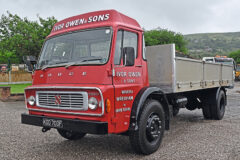
Previous Post
An interesting classic lorry collection
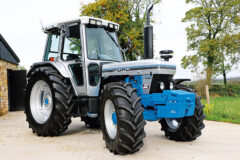
Next Post
Restoring a Ford Silver Jubilee 7810 tractor



